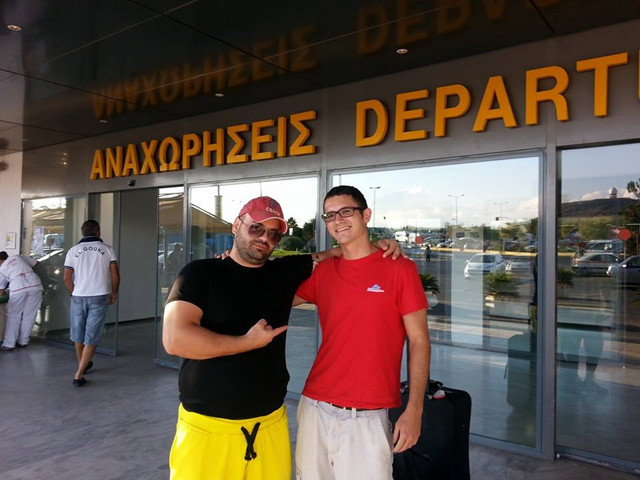This is the first in a series introducing some of the international students at Peking University HSBC Business School.
Located in the thriving entrepreneurial city of Shenzhen and adjacent to the Asian financial hub of Hong Kong, Peking University HSBC business school (PHBS) is endowed with an ideal setting for studying the frontiers of finance, economics and business management. With its favorable location and internationalized education, it acts like a magnet to draw young talent from all over the world to study here.
This fall, 70 exchange students and 43 full-time international students enrolled in PHBS programs. International students make PHBS a unique business school featuring diversity and vibrancy.
 Karras Lambert plays goalkeeper for the PKU football team. Here, he gets ready for practice.
Karras Lambert plays goalkeeper for the PKU football team. Here, he gets ready for practice.
Karras Lambert, from the United States, is pursuing a master’s degree in finance. A graduate of Drexel University with a bachelor’s degree in economics, Lambert had never thought about getting a master’s degree until he found out about PHBS. “I didn’t plan to go to graduate school at all. But I did want to come close to Shenzhen,” he admitted. It was in an international business course at his undergraduate university back in the U.S. that Lambert first learned about the Special Economic Zones in China. Since then, Lambert has been interested in Shenzhen, the first and most successful of the SEZs. “I've been waiting to come to Shenzhen for about 2 years,” he said.
When asked why Shenzhen impressed him, Lambert replied, “More things happen here than in America.” In contrast to most Chinese people’s impressions, he thinks that the U.S. is not a paradise for entrepreneurship because there are so many applications, licenses, and restrictions to deal with. However, with a favorable business environment, Shenzhen acts like a giant incubator for startups. “There are fewer barriers, lower administrative costs and more opportunities,” remarked Lambert. Like many PHBS students attracted by the city’s vitality, Lambert wants to seek out market niches and make a success out of them through entrepreneurship.
“It’s mostly due to sheer luck and a fortuitous conversation with a fellow student that I seized the chance to apply for PHBS,” Lambert said, admitting that he once accidentally deleted the email about the PHBS graduate program. Only after realizing it would be a golden chance to come to Shenzhen and get a master degree, Lambert dragged the email out of the trash. “I wanted to get a job and had no plans for a further education, but my classmate reminded me to check the email,” remarked Lambert. Though it was only about a month before the application deadline, he managed to not let the win-win choice slip away and even got a full scholarship.
Some people believe living up to original goals is wisdom, but Lambert loves to follow his heart. When he was an undergraduate, Lambert switched from playwriting to economics. “I figured out I wouldn’t enjoy doing it for a career,” said Lambert, talking about why he quit a coveted, hard-earned internship in Hollywood. It was the impetus to change his educational focus.
Unlike many people who make huge decisions only with full preparation, Lambert had no backup plan back then, but reading led him to find his true interest. The entry-level book
Economics in One Lesson, by Henry Hazlitt, made Lambert, a fan of Greek classics, realize the beauty of economics.
Since then, Lambert has read more books by investors and practitioners. “Reading books by investors enlightened me, and Jim Rogers was a major inspiration for why I switched my major,” Lambert said. He wishes that he could have heard the speech given by Jim Rogers at PHBS earlier this year. Lambert admires the legendary investor’s book,
Adventure Capitalist: The Ultimate Road Trip, which reflects Rogers’ investment philosophy to travel around, spot market niches and invest for high returns. “I want to see with my own eyes where China is heading, not just reading Rogers’ experience in China,” Lambert said with excitement.
However, Lambert feels economics alone cannot satisfy him, and his urge to learn something more practical grew after realizing that he’s “not a huge fan of economics taught at school” and does not want to be a teacher or work for a central bank. So Lambert chose to focus on finance, adding, “I don’t have a clear plan, but I want to work in the financial sector, maybe at a hedge fund.” Influenced by Nicholas Nassim Taleb, the author of
Black Swan and
Anti-fragile, Lambert now is more interested in risk management and believes the business mathematics that he is taking will better prepare him for the statistical analysis and modeling required in risk management.
“Maybe, I’ll be open to staying and creating opportunities in China if I get involved in something interesting,” Lambert said,“Otherwise, I might travel around to learn and spot opportunities along the journey.” For him, life is no longer about rigidly following the edict to “set goals and meet them.” He said, “I am trying not to get inflated expectations but to let nature run its course.”
 A good friend he made during a co-op experience in Greece takes Lambert, right, to the airport for departure. Co-op, short for cooperative education, integrates classroom study with real-life work experience.
By Annie Jin
Edited by Priscilla Young
For the Second in this Series, Click Read more
A good friend he made during a co-op experience in Greece takes Lambert, right, to the airport for departure. Co-op, short for cooperative education, integrates classroom study with real-life work experience.
By Annie Jin
Edited by Priscilla Young
For the Second in this Series, Click Read more
















